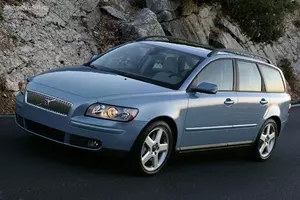
| Vehicle | Precise engine size | Difference from world average | Engine size to consumption ratio | Horsepower from 1 L | Engine size to 100 kg of weight |
|---|---|---|---|---|---|
| 1.6 |
1.6 L (1596 cc) |
32% smaller | 48 cc to 1 mpg | 63 hp from 1 L | 123 cc to 100 kg |
| 2.4i |
2.44 L (2435 cc) |
3.8% bigger | 94 cc to 1 mpg | 70 hp from 1 L | 162 cc to 100 kg |
| 1.8 F |
1.8 L (1798 cc) |
23.4% smaller | 56 cc to 1 mpg | 69 hp from 1 L | 128 cc to 100 kg |
| 2.4 |
2.44 L (2435 cc) |
3.8% bigger | 94 cc to 1 mpg | 57 hp from 1 L | 187 cc to 100 kg |
| 2.0 F |
2 L (1999 cc) |
14.8% smaller | 62 cc to 1 mpg | 73 hp from 1 L | 143 cc to 100 kg |
| 2.5 T5 |
2.52 L (2521 cc) |
7.5% bigger | 97 cc to 1 mpg | 91 hp from 1 L | 168 cc to 100 kg |
| 2.5 T5 AVVD |
2.52 L (2521 cc) |
7.5% bigger | 105 cc to 1 mpg | 91 hp from 1 L | 158 cc to 100 kg |
| 2.0 D |
2 L (1997 cc) |
14.9% smaller | 49 cc to 1 mpg | 68 hp from 1 L | 133 cc to 100 kg |
| 1.6 D DRIVe |
1.56 L (1560 cc) |
33.5% smaller | 26 cc to 1 mpg | 70 hp from 1 L | 111 cc to 100 kg |
| 2.4 D5 |
2.4 L (2400 cc) |
2.3% bigger | 71 cc to 1 mpg | 75 hp from 1 L | 160 cc to 100 kg |
| Vehicle | 1.6 |
|---|---|
| Precise engine size | 1.6 L (1596 cc) |
| Difference from world average | 32 smaller |
| Engine size to consumption ratio | 48 cc to 1 mpg |
| Horsepower from 1 L | 63 hp from 1 L |
| Engine size to 100 kg of weight | 123 cc to 100 kg |
| Vehicle | 2.4i |
| Precise engine size | 2.44 L (2435 cc) |
| Difference from world average | 3.8 bigger |
| Engine size to consumption ratio | 94 cc to 1 mpg |
| Horsepower from 1 L | 70 hp from 1 L |
| Engine size to 100 kg of weight | 162 cc to 100 kg |
| Vehicle | 1.8 F |
| Precise engine size | 1.8 L (1798 cc) |
| Difference from world average | 23.4 smaller |
| Engine size to consumption ratio | 56 cc to 1 mpg |
| Horsepower from 1 L | 69 hp from 1 L |
| Engine size to 100 kg of weight | 128 cc to 100 kg |
| Vehicle | 2.4 |
| Precise engine size | 2.44 L (2435 cc) |
| Difference from world average | 3.8 bigger |
| Engine size to consumption ratio | 94 cc to 1 mpg |
| Horsepower from 1 L | 57 hp from 1 L |
| Engine size to 100 kg of weight | 187 cc to 100 kg |
| Vehicle | 2.0 F |
| Precise engine size | 2 L (1999 cc) |
| Difference from world average | 14.8 smaller |
| Engine size to consumption ratio | 62 cc to 1 mpg |
| Horsepower from 1 L | 73 hp from 1 L |
| Engine size to 100 kg of weight | 143 cc to 100 kg |
| Vehicle | 2.5 T5 |
| Precise engine size | 2.52 L (2521 cc) |
| Difference from world average | 7.5 bigger |
| Engine size to consumption ratio | 97 cc to 1 mpg |
| Horsepower from 1 L | 91 hp from 1 L |
| Engine size to 100 kg of weight | 168 cc to 100 kg |
| Vehicle | 2.5 T5 AVVD |
| Precise engine size | 2.52 L (2521 cc) |
| Difference from world average | 7.5 bigger |
| Engine size to consumption ratio | 105 cc to 1 mpg |
| Horsepower from 1 L | 91 hp from 1 L |
| Engine size to 100 kg of weight | 158 cc to 100 kg |
| Vehicle | 2.0 D |
| Precise engine size | 2 L (1997 cc) |
| Difference from world average | 14.9 smaller |
| Engine size to consumption ratio | 49 cc to 1 mpg |
| Horsepower from 1 L | 68 hp from 1 L |
| Engine size to 100 kg of weight | 133 cc to 100 kg |
| Vehicle | 1.6 D DRIVe |
| Precise engine size | 1.56 L (1560 cc) |
| Difference from world average | 33.5 smaller |
| Engine size to consumption ratio | 26 cc to 1 mpg |
| Horsepower from 1 L | 70 hp from 1 L |
| Engine size to 100 kg of weight | 111 cc to 100 kg |
| Vehicle | 2.4 D5 |
| Precise engine size | 2.4 L (2400 cc) |
| Difference from world average | 2.3 bigger |
| Engine size to consumption ratio | 71 cc to 1 mpg |
| Horsepower from 1 L | 75 hp from 1 L |
| Engine size to 100 kg of weight | 160 cc to 100 kg |

| Vehicle | Precise engine size | Difference from world average | Engine size to consumption ratio | Horsepower from 1 L | Engine size to 100 kg of weight |
|---|---|---|---|---|---|
| 2.5 20V T5 |
2.52 L (2521 cc) |
7.5% bigger | 93 cc to 1 mpg | 87 hp from 1 L | - |
| 2.4 20V |
2.44 L (2435 cc) |
3.8% bigger | 87 cc to 1 mpg | 57 hp from 1 L | 162 cc to 100 kg |
| 2.4 i 20V |
2.44 L (2435 cc) |
3.8% bigger | 94 cc to 1 mpg | 70 hp from 1 L | 162 cc to 100 kg |
| 1.6 i 16V |
1.6 L (1596 cc) |
32% smaller | - | 63 hp from 1 L | 123 cc to 100 kg |
| 1.8 i 16V |
1.8 L (1798 cc) |
23.4% smaller | - | 69 hp from 1 L | 138 cc to 100 kg |
| 1.6 D |
1.56 L (1560 cc) |
33.5% smaller | - | 71 hp from 1 L | 120 cc to 100 kg |
| 2.0 D |
2 L (1998 cc) |
14.8% smaller | 49 cc to 1 mpg | 68 hp from 1 L | 133 cc to 100 kg |
| Vehicle | 2.5 20V T5 |
|---|---|
| Precise engine size | 2.52 L (2521 cc) |
| Difference from world average | 7.5 bigger |
| Engine size to consumption ratio | 93 cc to 1 mpg |
| Horsepower from 1 L | 87 hp from 1 L |
| Engine size to 100 kg of weight | - |
| Vehicle | 2.4 20V |
| Precise engine size | 2.44 L (2435 cc) |
| Difference from world average | 3.8 bigger |
| Engine size to consumption ratio | 87 cc to 1 mpg |
| Horsepower from 1 L | 57 hp from 1 L |
| Engine size to 100 kg of weight | 162 cc to 100 kg |
| Vehicle | 2.4 i 20V |
| Precise engine size | 2.44 L (2435 cc) |
| Difference from world average | 3.8 bigger |
| Engine size to consumption ratio | 94 cc to 1 mpg |
| Horsepower from 1 L | 70 hp from 1 L |
| Engine size to 100 kg of weight | 162 cc to 100 kg |
| Vehicle | 1.6 i 16V |
| Precise engine size | 1.6 L (1596 cc) |
| Difference from world average | 32 smaller |
| Engine size to consumption ratio | - |
| Horsepower from 1 L | 63 hp from 1 L |
| Engine size to 100 kg of weight | 123 cc to 100 kg |
| Vehicle | 1.8 i 16V |
| Precise engine size | 1.8 L (1798 cc) |
| Difference from world average | 23.4 smaller |
| Engine size to consumption ratio | - |
| Horsepower from 1 L | 69 hp from 1 L |
| Engine size to 100 kg of weight | 138 cc to 100 kg |
| Vehicle | 1.6 D |
| Precise engine size | 1.56 L (1560 cc) |
| Difference from world average | 33.5 smaller |
| Engine size to consumption ratio | - |
| Horsepower from 1 L | 71 hp from 1 L |
| Engine size to 100 kg of weight | 120 cc to 100 kg |
| Vehicle | 2.0 D |
| Precise engine size | 2 L (1998 cc) |
| Difference from world average | 14.8 smaller |
| Engine size to consumption ratio | 49 cc to 1 mpg |
| Horsepower from 1 L | 68 hp from 1 L |
| Engine size to 100 kg of weight | 133 cc to 100 kg |